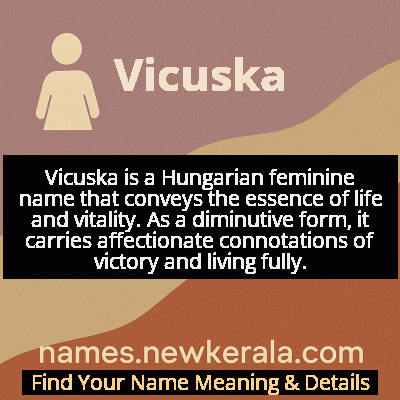Vicuska Name Meaning & Details
Origin, Popularity, Numerology Analysis & Name Meaning of Vicuska
Discover the origin, meaning, and cultural significance of the name VICUSKA. Delve into its historical roots and explore the lasting impact it has had on communities and traditions.
Name
Vicuska
Gender
Female
Origin
Hungarian
Lucky Number
5
Meaning of the Name - Vicuska
Vicuska is a Hungarian feminine name that conveys the essence of life and vitality. As a diminutive form, it carries affectionate connotations of victory and living fully.
Vicuska - Complete Numerology Analysis
Your Numerology Number
Based on Pythagorean Numerology System
Ruling Planet
Mercury
Positive Nature
Adventurous, dynamic, curious, and social.
Negative Traits
Restless, impatient, inconsistent, prone to indulgence.
Lucky Colours
Green, white.
Lucky Days
Wednesday.
Lucky Stones
Emerald.
Harmony Numbers
1, 3, 9.
Best Suited Professions
Sales, marketing, travel, entertainment.
What People Like About You
Versatility, charisma, adventurous spirit.
Famous People Named Vicuska
Vicuska Szabó
Folk Singer
Preserved traditional Hungarian folk music and performed internationally
Vicuska Kovács
Educator
Founded innovative language programs for Hungarian diaspora communities
Vicuska Horváth
Textile Artist
Revived traditional Hungarian embroidery techniques in modern fashion
Name Variations & International Equivalents
Click on blue names to explore their detailed meanings. Gray names with will be available soon.
Cultural & Historical Significance
Historically, names like Vicuska were predominantly used in rural areas and within family settings, representing the intimate, personal sphere of Hungarian social life rather than formal public identity. The name's connection to Viktória (Victoria) also ties it to Christian influences in Hungarian culture while maintaining a distinctly Hungarian character through its diminutive formation. During the 19th century national revival movement, such names gained symbolic importance as markers of Hungarian identity distinct from Austrian and other foreign influences.
Extended Personality Analysis
Women named Vicuska are often perceived as warm, approachable, and nurturing individuals who value close personal relationships. The diminutive nature of the name suggests someone who is down-to-earth, genuine, and comfortable in intimate social settings rather than seeking the spotlight. They typically exhibit strong emotional intelligence and the ability to create harmonious environments, making them excellent mediators and supportive friends. The connection to 'victory' and 'life' in the name's root meaning often translates to resilient personalities who approach challenges with quiet determination rather than aggressive ambition.
Vicuska's tend to be creative problem-solvers who prefer collaborative approaches and value community over individual achievement. Their strength lies in their adaptability and their ability to find joy in simple pleasures, making them stable anchors in their social circles. While they may not seek leadership positions, they often become the emotional center of their families and communities through their consistent support and practical wisdom. This combination of gentle strength and genuine warmth makes them particularly effective in roles that require patience, empathy, and long-term commitment to relationships and causes.
Modern Usage & Popularity
In contemporary Hungary, Vicuska remains a cherished traditional name, though its usage has evolved significantly. While it was once primarily a familial diminutive used within homes, it has gained acceptance as a formal given name in recent decades, particularly among parents seeking uniquely Hungarian names that honor tradition while standing out from more common international variants. The name experiences periodic resurgences during cultural revival movements when Hungarians seek to preserve linguistic heritage. Current usage trends show it's most popular among educated urban families who value cultural roots, though it maintains stronger continuous usage in rural areas where traditional naming practices persist. Social media and global connectivity have also created a niche appreciation for the name among diaspora Hungarians seeking to maintain cultural connections. Despite not ranking among the top 100 most popular names, Vicuska maintains steady usage as a choice that balances tradition with distinctive character.
Symbolic & Spiritual Meanings
Symbolically, Vicuska represents the Hungarian concept of 'otthon' (home) - embodying warmth, familiarity, and the security of close relationships. The name carries connotations of life's simple victories - the personal triumphs of daily existence, family bonds, and community continuity rather than grand historical conquests. It symbolizes the enduring strength found in humility and the power of subtle influence over overt dominance. In Hungarian cultural symbolism, the '-ka' diminutive evokes images of spring blossoms, suggesting renewal, gentle growth, and the cyclical nature of life. The name also represents cultural preservation - serving as a linguistic artifact that maintains Hungarian naming traditions against globalizing influences. Metaphorically, Vicuska embodies the idea that true victory lies not in dominating others but in sustaining meaningful connections and personal integrity across generations.

